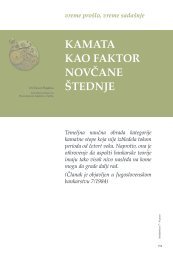okvir nove evropske bankarske regulative - Udruženje banaka Srbije
okvir nove evropske bankarske regulative - Udruženje banaka Srbije
okvir nove evropske bankarske regulative - Udruženje banaka Srbije
You also want an ePaper? Increase the reach of your titles
YUMPU automatically turns print PDFs into web optimized ePapers that Google loves.
ankarstvo - <br />
system but will not it itself be a sufficient<br />
requirement guaranteeing financial stability.<br />
Thus the Basel Commiee recommended<br />
corresponding steps to be undertaken at the<br />
macro-prudential level:<br />
1. Capital adequacy measure to be supplemented<br />
by corresponding internationally harmonised<br />
capital availability ratio. The aim is to prevent<br />
the banks from circumventing requirements<br />
prescribed in the new regulatory framework.<br />
2. Introduction of counter-cyclic reserves<br />
which are to be replenished during the times<br />
of economic i.e. financial boom, and which<br />
shall be activated once the bank comes in<br />
the position of finding its operational funds<br />
insufficient to respond to the requests of<br />
clients regarding the approval of additional<br />
credit facilities.<br />
3. The new rules are to be introduced on<br />
derivatives with the objective of reducing<br />
their use as complex instruments with their<br />
value linked to the underlying financial<br />
benchmark. Degradation of derivative<br />
instruments has started when their emphatic<br />
risk-prone form: the instrument of the credit<br />
default swap, lost the confidence of the actors<br />
on the market and caused enormous losses<br />
to be incurred by the insurance company<br />
the American International Group (AIG),<br />
but also by the other institutions engaged<br />
in insuring financial market operations. The<br />
reform shall strive to avoid such situations<br />
from occurring ever again.<br />
American corporations are already warning<br />
of the secondary effects of the new regulatory<br />
framework in the area of derivative securities.<br />
Many companies are buying various types of<br />
derivative instruments with the objective of<br />
protecting revenues from the interest rates<br />
volatility, prices of raw material and foreign<br />
currency exchange rates (a procedure known<br />
under the term of hedging). For example,<br />
airplane companies have controlled their cost<br />
of fuel through these derivatives, large-scale<br />
foodstuffs processing industries have used<br />
these instruments as protection against the<br />
price volatility, especially of the cereals and<br />
meat (as a curiosity, the case is quoted of the<br />
Tiffany jewellers using derivatives to supervise<br />
price volatility of gold and silver).<br />
Companies are stating that under the new<br />
regime they will be able to use the swap of<br />
financial instruments deals only if the control is<br />
to be strictly implemented at the international<br />
level, i.e. in all the segments of the financial<br />
market. The derivatives based on the swaps of<br />
one level of liquidity with another one, either<br />
a lower or a high level, directly impact cash<br />
reserves of the economic entities. Regulations<br />
now in force require companies to make<br />
provisioning of some 3% of the contracted<br />
value in the form of collateral. New regulations,<br />
however, shall have as consequence for the firms<br />
using derivatives to have relatively lower capital<br />
for investments as they shall have to make<br />
provisioning for a higher amount for collateral<br />
guarantees (thus, for example, German electrical<br />
equipment manufacturing giant, Siemens, states<br />
that it will need one billion dollars for additional<br />
reserves, and the British aircra engine producer<br />
Roles Royce is counting with four billion dollars<br />
of additional reserves).<br />
Another potential problem announced with<br />
the change in the banking operations regulatory<br />
framework in connection with the derivatives,<br />
is that they shall themselves become a less<br />
efficient financial instrument than they were so<br />
far. Derivatives were being sold to companies<br />
depending on their immediate necessities,<br />
while the new contracts on swap deals will be<br />
to a greater degree standardised and shall thus<br />
not be convenient for all the users. Corporations<br />
have so far easily negotiated any date that they<br />
wished to determine in their derivative contract<br />
deal, but from now on such contracts shall have<br />
pre-set, typical dates (in principle, they would<br />
be set at a certain end-of-the-month date, as<br />
a “standard date”). In addition, the costs of<br />
derivative instruments shall also substantially<br />
grow: banks have before the crisis charged less<br />
than 0.1% of the nominal contract value, but<br />
now this charge has grown to some 3%.<br />
III<br />
The new capital-focused regulatory<br />
framework which, according to expectations,<br />
is to come into force by the end of next year<br />
will require the banks to adopt a substantially<br />
different conduct. Especially singled out will<br />
be the investment banks in view of the new<br />
rules requiring “sanctioning” for irregularities













